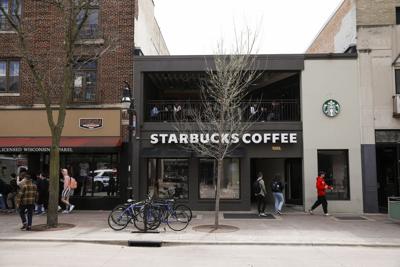Two days after the largest one-day union filing in Starbucks history launched union drives at 21 stores, students at more than two dozen U.S. universities are calling on their schools to kick the coffee giant off campus for allegedly violating labor laws.
The biggest of those schools is the University of Wisconsin-Madison, where a new student group wants the university to end the licensing contract that lets Starbucks operate a cafe inside Smith Residence Hall.
Members of the UW-Madison chapter of Students Against Starbucks held a rally and press conference Thursday outside the university’s Memorial union. Their goal, they said in a press release, is to support workers, many of them students, at Madison’s two unionized Starbucks locations, and to oppose the company’s “anti-labor reputation and numerous labor law violations.”
“Although the University of Wisconsin-Madison claims to be driven by the Wisconsin Idea, especially through its commitment to the community, the University’s contracts with companies like Starbucks do not reflect this sentiment,” they wrote in a petition to Chancellor Jennifer Mnookin.
Similar rallies were scheduled to take place Thursday at two dozen other U.S. universities, the Guardian reported this week. The schools, which dubbed the events “Starbucks gets an F,” include the University of Chicago, the University of South Florida, New York University, Georgetown and Rutgers.
“We believe that companies found to have violated workers’ rights to organize and collectively bargain should face consequences. We call on you to stand with us in these beliefs,” the UW-Madison group wrote in its petition.
Starbucks opposes unionization, saying it prefers a “direct” relationship with its workers, but it argues that it recognizes its employees’ right to organize. The company and its attorneys have been charged with more than 700 unfair labor practices, including for allegedly refusing to bargain and closing more than 20 unionized stores. The U.S. Supreme Court will hear a case this year on whether the National Labor Relations Board can force the company to rehire workers who the union alleges were fired for union organizing.
“While we remain longstanding advocates of civil discourse, our focus is on fulfilling our promise to offer all partners a bridge to a better future — through competitive pay, industry-leading benefits for part-time work and our continued efforts to negotiate fair contracts for partners at stores that have chosen union representation,” Starbucks spokesperson Andrew Trull said in an email.
Workers at the campus store are employed not by Starbucks but by the licensee, Trull said. “We do not have any influence or control over their wages or benefits or anything associated with that.”
University Housing opened the franchise in Smith Residence Hall in 2020 after Starbucks was selected through “a competitive bidding process and evaluation that included student feedback,” UW-Madison spokesperson Greg Bump said in a statement. The company was awarded a 10-year contract.
Full-time positions start at $17 an hour and student positions start at $15 an hour, Bump said, noting that the university discourages student workers from working more than 20 hours a week.
“University Housing manages staffing at this venue with the same principles and practices as our other positions, to offer fair wages, a healthy work/life balance, a positive workplace, and flexible scheduling,” Bump said.
Last year, on orders from shareholders, Starbucks hired an independent labor expert to assess its response to worker organizing. The review recommended that Starbucks should better train managers to comply with labor laws, ensure that it applies standards consistently to unionized and non-unionized employees, and clarify its commitment to the collective bargaining rights of its workers.
It also urged the company to attempt to restart the stalled bargaining process. “This issue will not resolve without Starbucks’ engaging constructively with the union,” the author wrote.
The UW-Madison campaign follows a successful effort by Cornell University students last year. Following pressure from students and a National Labor Relations Board finding that Starbucks illegally retaliated against pro-union student baristas, Cornell announced that it won’t renew the partnership through which the university serves Starbucks products in its cafes and dining halls when it ends in 2025.
Two more local stores file for union elections
The UW student effort comes just days after workers at two Madison-area Starbucks stores filed for union elections, joined by workers at 19 other stores across the country.
The Madison store at 2157 Rimrock Road and the Monona store at 6512 Monona Drive would be the fourth and fifth Starbucks locations in Dane County to hold union elections. In 2022, the Capitol Square store overwhelmingly voted in Workers United, the same union that represents almost all of the nearly 400 unionized Starbucks locations in the U.S. The State Street store did the same last May.
“Across the country management is cutting hours, writing inconsistent and unreliable schedules, and placing more and more work on fewer and fewer partners,” workers from across the country wrote in a joint letter to Starbucks CEO Laxman Narasimhan. “Though we work at different stores, we are united through our shared experiences and in our demand for higher wages, fair and consistent scheduling, improved benefits, and a safe and dignified workplace.”
Trull, the Starbucks spokesperson, said in an email that the company will “encourage all partners at stores petitioning for representation to get the facts, make an informed choice and ensure their voice (is) heard by voting” in the requested union elections.



